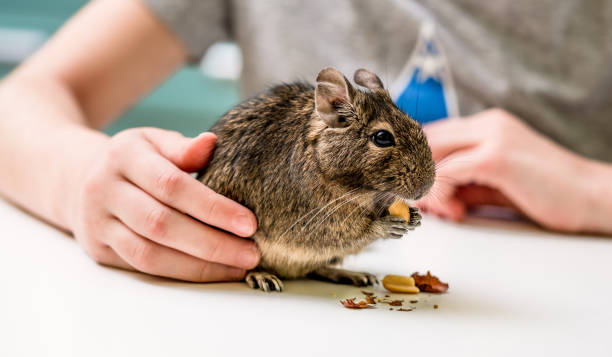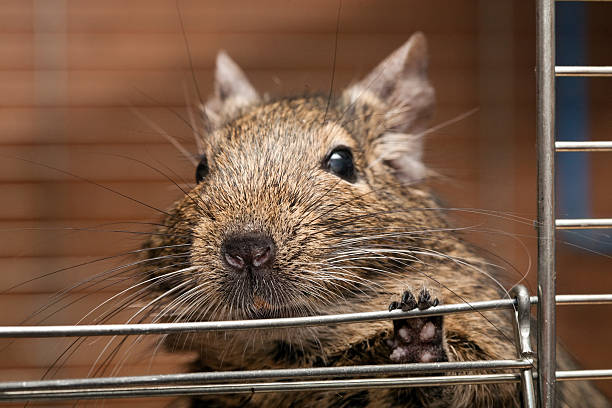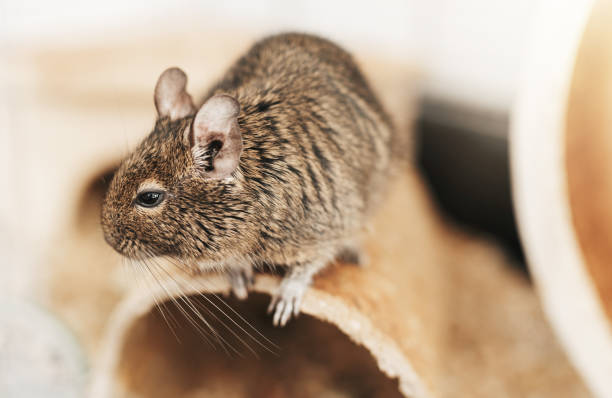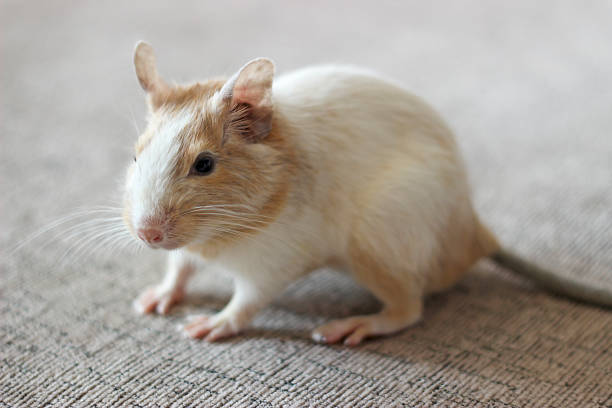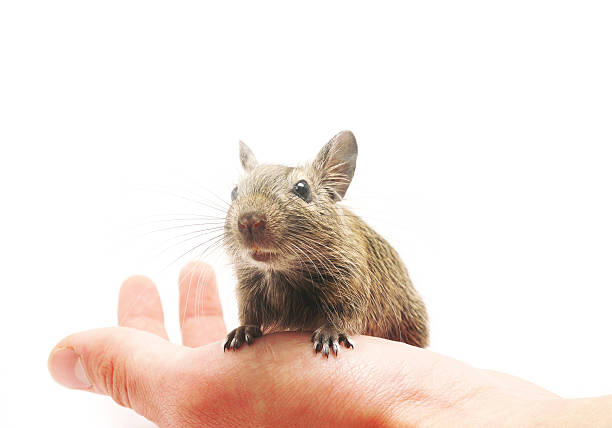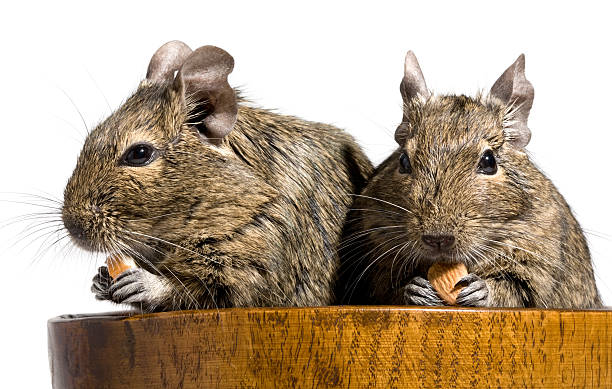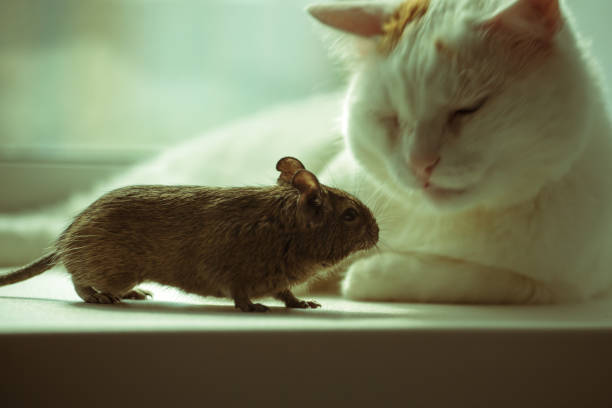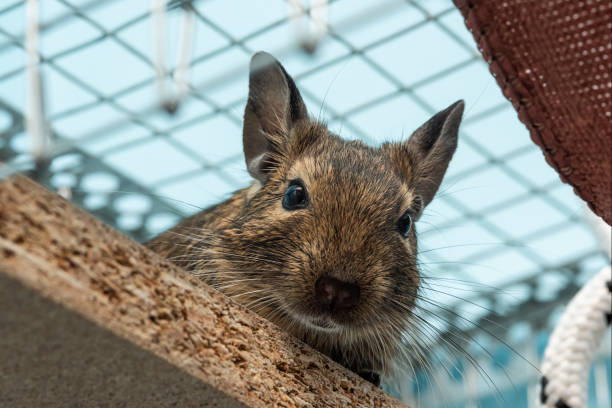Nurturing Your Furry Friends: Degu Diet and Nutrition
This post contains affiliate links. This means I will make a commission at no extra cost to you should you click through and make a purchase. Read the full disclosure here.
Welcome to the world of responsible degu ownership! As a degu parent, you’ve embarked on a rewarding journey of caring for these delightful and sociable rodents. One of the most crucial aspects of ensuring your degus lead happy and healthy lives is understanding and providing them with the right diet and nutrition.
In this comprehensive guide, we’ll delve into the intricacies of degu dietary requirements and explore the foods that are not only safe but also essential for their well-being. Just like humans, degus require a balanced diet to thrive, and it’s our duty as their caregivers to meet those needs.
Degu Dietary Requirements
The Fiber Fanatics: Degus are known as “fiber fanatics” in the rodent world. Their digestive systems are adapted to process a high-fiber diet. Unlike some other small mammals, degus thrive on a low-fat, high-fiber regimen.
The Necessity of Fresh Water: Just like any other living creature, degus requires a steady supply of fresh, clean water. We’ll discuss the importance of hydration in more detail later on.
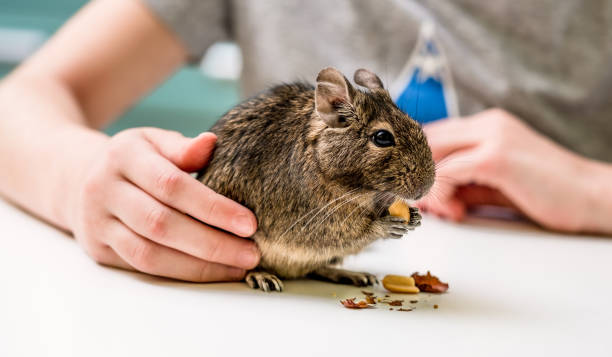
Suitable Foods for Degus
Now that we’ve established the unique dietary requirements of degus, let’s dive into the specifics of what you can feed your furry friends. Providing a well-balanced diet is not only essential for their health but also a source of joy for both you and your degus. Watching them nibble on their favorite foods is a delightful experience.
Here’s a detailed list of foods that are safe and healthy for your degus:
1. Fresh Vegetables:
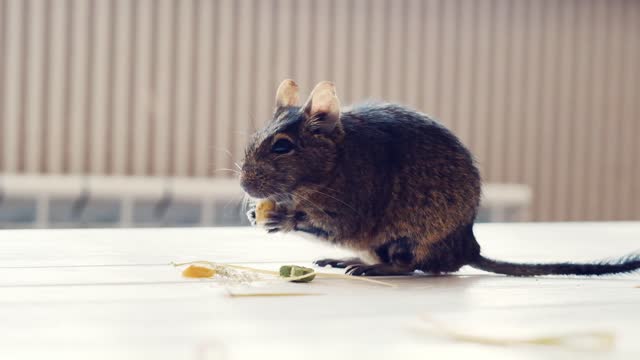
Degus enjoy a variety of fresh vegetables. Some of their favorites include:
- Lettuce: Leafy greens like romaine, green leaf, and red leaf lettuce are excellent choices.
- Bell Peppers: Green, red, and yellow bell peppers are rich in Vitamin C.
- Carrots: A crunchy snack that degus love, but feed in moderation due to their sugar content.
- Broccoli: A good source of vitamins and minerals.
- Cucumber: A hydrating treat on a hot day.
- Kale: Provides essential nutrients, but should be offered sparingly due to its calcium content.
Remember, moderation is key when feeding vegetables to degus. While these greens are healthy, excessive consumption can lead to digestive issues.
2. Hay:
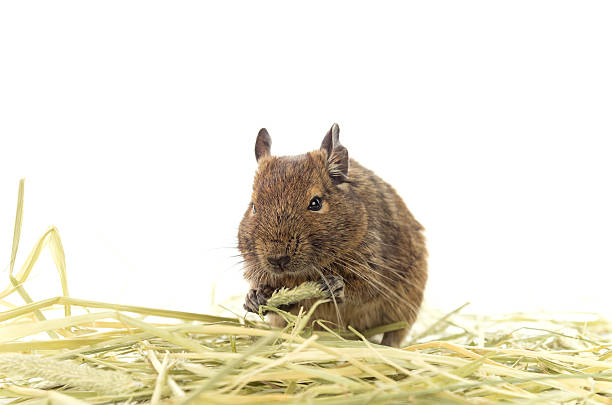
Hay is a cornerstone of a degu’s diet. It provides essential fiber, aids in digestion, and helps keep their teeth in check. Offer high-quality, fresh hay, such as timothy hay or meadow hay, on a daily basis. Make sure it’s clean and free from mold or dust.
3. Specialized Degu Pellets:
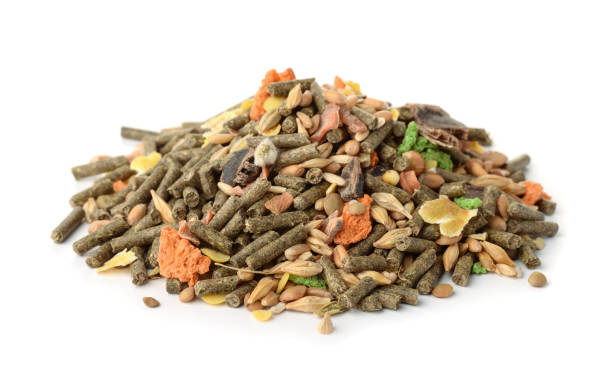
Commercial degu pellets are formulated to meet their specific nutritional needs. Look for high-fiber pellets with no added sugars or artificial colors. Pellets should be a staple in their diet, but they should not make up the entirety of their meals.
4. Fresh, Clean Water:
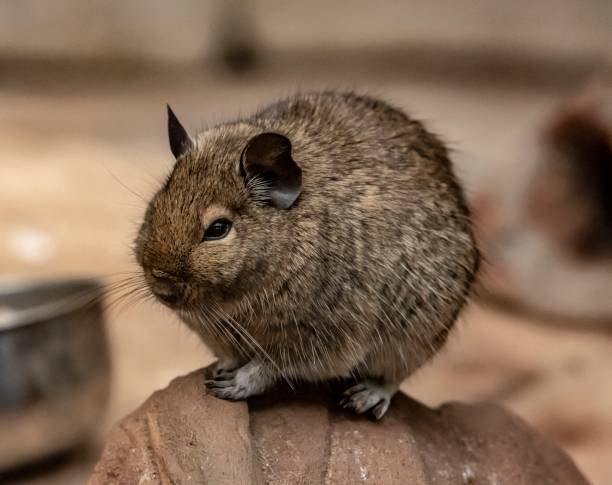
Provide a continuous supply of fresh, clean water. Invest in a water bottle designed for small animals to ensure they have access to water at all times. Regularly check the water bottle to make sure it’s working properly and not clogged.
5. Occasional Treats:

While the core of their diet should consist of hay, pellets, and fresh vegetables, you can offer occasional treats to your degus. These can include small portions of fruits like apples, pears, or berries. However, these should be given sparingly due to their sugar content. Treats can be a great way to bond with your degus or offer rewards for good behavior.
When introducing new foods into your degus’ diet, do so gradually. Their sensitive digestive systems may react negatively to sudden changes. Monitor their reactions to new foods and adjust accordingly.
The Role of Hay in Degu Nutrition
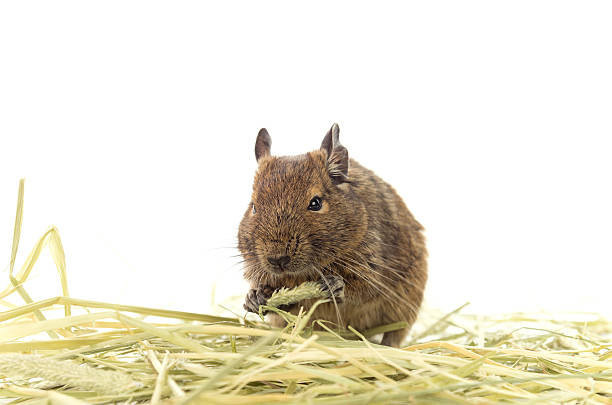
Hay is more than just bedding for your degus; it’s a dietary cornerstone essential to their health and well-being. In this section, we’ll explore why hay is such a crucial component of a degu’s diet.
1. Fiber for Healthy Digestion:
Degus have intricate digestive systems that thrive on a high-fiber diet. Hay, with its coarse and fibrous structure, is the perfect food to keep their digestive tracts functioning smoothly. It aids in preventing constipation and other digestive issues that can plague these furry friends.
2. Dental Health:
Degus have ever-growing teeth, much like other rodents. Chewing on hay helps naturally wear down their teeth, preventing overgrowth and dental problems. Dental health is closely linked to their overall well-being, making hay a vital tool for maintaining those chompers.
3. Mental Stimulation:
Hay isn’t just about nutrition; it’s also a source of mental stimulation for your degus. As natural foragers, they enjoy digging and sifting through hay, mimicking their behavior in the wild. This activity keeps their minds active and engaged, contributing to their overall happiness.
4. Hay Variety:
There are various types of hay available, each with its own nutritional benefits. The most common types suitable for degus include:
- Timothy Hay: A popular choice, low in calcium and high in fiber.
- Meadow Hay: Offers a diverse blend of grasses for added variety.
- Orchard Grass Hay: A slightly sweeter option that some degus enjoy.
- Bermuda Grass Hay: Another nutritious choice, though it may be less readily available.
Offer a mix of these hays to add variety to your degus’ diet and keep them interested.
5. Providing Fresh Hay:
To ensure your degus receive the full benefits of hay, it’s essential to provide fresh, clean hay regularly. Replace their hay when it becomes soiled or runs low, as they rely on it for nutrition, dental health, and mental stimulation.
Remember that hay should always be free of mold or dust. Store it in a cool, dry place to maintain its quality.
Creating a Balanced Meal Plan
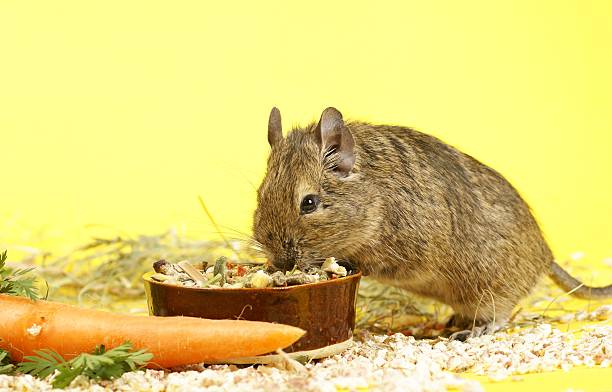
Ensuring your degus receive a balanced diet is paramount to their health and happiness. In this section, we’ll explore how to create a well-rounded meal plan that meets their nutritional needs.
1. The Hay Foundation:
As mentioned earlier, hay is the foundation of a degu’s diet. It should make up the majority of their daily food intake. Offer fresh hay every day, providing them with a constant source of fiber, mental stimulation, and dental care.
2. Pellets as a Staple:
Commercial degu pellets are formulated to provide essential nutrients. However, they should not be the sole component of their diet. Pellets should complement their hay intake, not replace it. Offer a measured amount of pellets each day, following the manufacturer’s recommendations for serving size.
3. Fresh Vegetables for Variety:
Fresh vegetables add variety and essential nutrients to your degus’ diet. Introduce a small portion of fresh vegetables daily, such as lettuce, bell peppers, carrots, or cucumber. Remember that moderation is key to preventing digestive issues.
4. Treats in Moderation:
Treats, including fruits like apples, pears, or berries, can be a delightful addition to your degus’ diet. However, they should be considered occasional indulgences due to their sugar content. Use treats sparingly and as rewards for good behavior.
5. Hydration Matters:
Ensure your degus have constant access to fresh, clean water. Proper hydration is essential for digestion and overall well-being. Invest in a water bottle designed for small animals to keep their water source clean and accessible.
6. Mealtime Consistency:
Establish a consistent feeding schedule for your degus. Regular meal times help them anticipate when food will be available, reducing stress and ensuring they receive the nutrition they need.
7. Monitor Their Health:
Observe your degus’ eating habits and behavior. Sudden changes in appetite or weight loss can be signs of underlying health issues. Regular monitoring allows you to address any concerns promptly.
8. Gradual Introductions:
When introducing new foods into your degus’ diet, do so gradually. Their sensitive digestive systems may need time to adjust. Monitor their reactions and adjust their diet accordingly.
By adhering to this balanced meal plan, you’ll provide your degus with the nutrition they require to thrive. Remember that every degu is unique, so you may need to adjust your diet based on individual preferences and needs.
Supplementing Their Diet and Occasional Treats
While the core of your degus’ diet should consist of hay, pellets, and fresh vegetables, there’s room for some supplemental goodies in their diet. In this section, we’ll explore the importance of supplements and how to indulge your degus with occasional treats.
1. Supplementing Their Diet:
a. Vitamin C: Degus, like humans, cannot synthesize Vitamin C and must obtain it from their diet. While fresh vegetables can provide some Vitamin C, you can also consider providing a Vitamin C supplement. Consult your veterinarian for the appropriate dosage.
b. Calcium: Ensure your degus receive an appropriate amount of calcium. While hay provides some calcium, excessive amounts can lead to urinary problems. High-calcium vegetables like kale should be given sparingly.
2. Occasional Treats:
Treats can be a fun way to bond with your degus and offer them rewards for good behavior. However, it’s crucial to exercise moderation due to their sensitivity to sugars and fats.
a. Fruits: Small portions of fruits like apple slices, pear slices, or berries can be offered as occasional treats. Remove any seeds or pits, and feed these sparingly due to their sugar content.
b. Commercial Treats: Some pet stores offer commercial degu treats. Ensure these treats are specifically designed for degus and don’t contain harmful additives, artificial colors, or excessive sugars.
c. Homemade Treats: Consider making your own degu treats at home. This way, you have control over the ingredients. Homemade treats can include small portions of plain oats, dried herbs, or homemade hay-based treats.
d. Nutritional Balance: When providing treats, be mindful of the overall nutritional balance of your degus’ diet. The bulk of their nutrition should still come from hay, pellets, and fresh vegetables.
3. Treats as Rewards:
Use treats as rewards for positive behavior or during playtime. This reinforces their bond with you and encourages them to engage in enriching activities. Remember to keep track of treat portions to prevent overindulgence.
4. Monitoring Their Health:
As you introduce new supplements or treats into their diet, keep a close eye on your degus’ health and behavior. If you notice any adverse reactions or changes in their well-being, discontinue the new item and consult with a veterinarian.
In the next section, we’ll discuss foods to avoid, as well as the importance of maintaining a balanced diet to keep your degus healthy and happy.
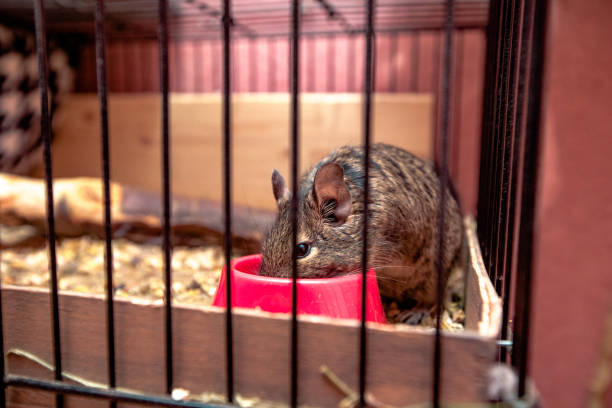
Foods to Avoid
As much as it’s essential to know what to feed your degus, it’s equally crucial to understand what foods should be avoided to keep them healthy and happy.
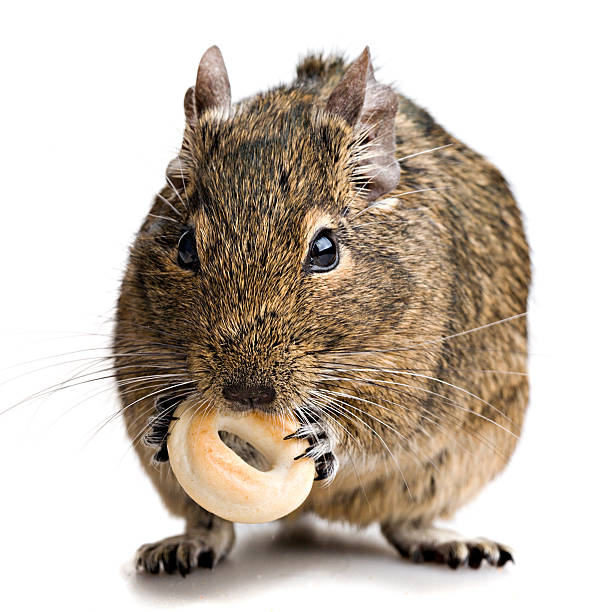
1. Foods to Avoid:
a. Sugary Treats: Degus have a sensitive digestive system, and sugary treats can lead to obesity and dental problems. Avoid giving them sugary foods, including candy, sugary cereals, and anything high in fructose or glucose.
b. Fatty Foods: High-fat foods can lead to obesity and liver problems in degus. Avoid foods like nuts, seeds, and fatty dairy products.
c. Processed Foods: Highly processed human foods often contain additives, preservatives, and artificial colors that can harm your degus. Stick to natural, unprocessed foods.
d. High-Calcium Foods: While calcium is essential, excessive calcium intake can lead to urinary tract problems. Limit high-calcium foods like spinach and kale.
e. Onions and Garlic: These can be toxic to degus and should be avoided entirely.
f. Chocolate and Caffeine: These substances are toxic to degus and should never be given to them.
Signs of Nutritional Problems and Regular Monitoring
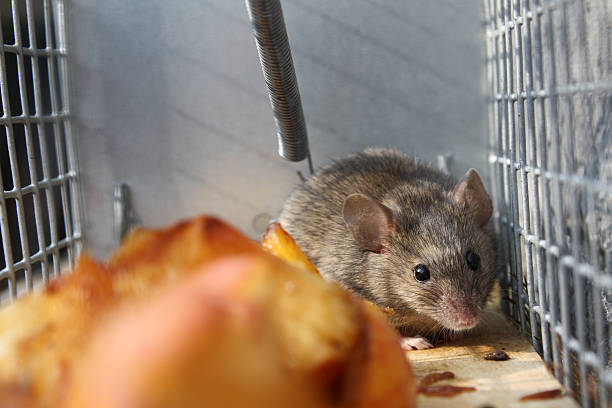
As a responsible degu owner, it’s crucial to keep a close watch on your furry friend’s health and well-being. In this section, we’ll discuss the signs that may indicate nutritional problems and the importance of regular monitoring.
1. Signs of Nutritional Problems:
Nutritional issues can manifest in various ways. Pay attention to these signs that may indicate your degus are not receiving the proper nutrition:
a. Weight Changes: Sudden weight loss or gain can be a sign of an unbalanced diet or underlying health issues. Regularly weigh your degus and consult with a veterinarian if you notice significant fluctuations.
b. Dental Problems: Overgrown teeth or dental issues can result from an inadequate diet. If your degus have difficulty eating or shows signs of dental discomfort, it’s time for a diet evaluation.
c. Digestive Issues: Diarrhea, constipation, or changes in stool consistency can be indicative of dietary problems. Keep an eye on their feces and make adjustments to their diet as needed.
d. Unusual Behavior: Nutritional problems can affect your degus’ behavior. If you notice lethargy, a lack of appetite, or unusual behavior, it may be time to review your diet.
e. Dull Coat and Skin Issues: A lack of essential nutrients can lead to a dull coat and skin problems. A healthy diet should result in a shiny, well-groomed appearance.
2. Regular Monitoring:
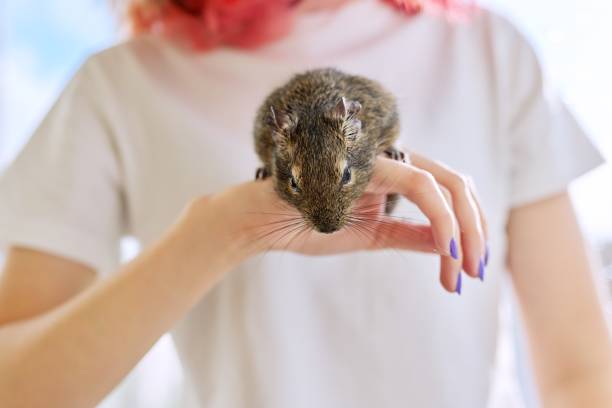
Maintaining a balanced diet and ensuring your degus receive the proper nutrition is an ongoing process. Here’s how you can establish a routine for regular monitoring:
a. Regular Weigh-Ins: Weigh your degus regularly to track their weight and identify any sudden changes. Weight loss can be an early indicator of health or nutritional issues.
b. Behavior Observation: Pay attention to your degus’ behavior during feeding times and throughout the day. Healthy degus are active, curious, and eager to eat.
c. Dental Checks: Examine your degus teeth regularly to ensure they are not overgrown or causing discomfort. If you notice any issues, consult a veterinarian.
d. Stool Inspection: Keep an eye on their feces for any irregularities. Abnormal stool consistency can signal digestive problems.
e. Vet Check-Ups: Schedule regular check-ups with an experienced veterinarian who is knowledgeable about degus. They can provide professional guidance and perform thorough health assessments.
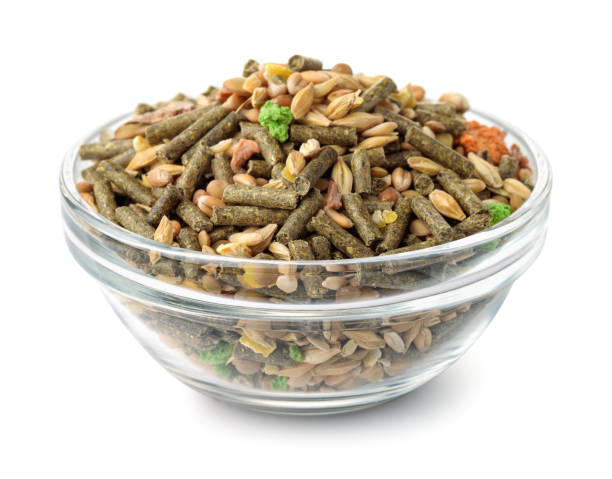
Final Thoughts
As you continue on your journey as a degu parent, remember that the love and care you provide play a pivotal role in your furry friend’s happiness and well-being. Embrace the moments of joy, curiosity, and companionship that your degus bring into your life.
Your dedication to understanding and meeting your degus’ needs sets the stage for a long, fulfilling adventure together. Cherish every moment with your charming and sociable companions, and keep the spirit of exploration alive in your degu habitat.

